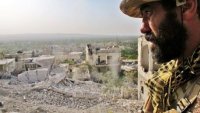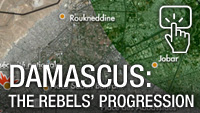www.aljazeerah.info
News, December 2012
Archives
Mission & Name
Conflict Terminology
Editorials
Gaza Holocaust
Gulf War
Isdood
Islam
News
News Photos
Opinion Editorials
US Foreign Policy (Dr. El-Najjar's Articles)
www.aljazeerah.info
|
Editorial Note: The following news reports are summaries from original sources. They may also include corrections of Arabic names and political terminology. Comments are in parentheses. |
Assad Regime in is Final Phase, Talks About Use of Chemical Weapons in Syrian Civil War
December 8, 2012
Assad regime now in ‘final phase’

Demonstrators protest against Syria’s President Bashar Assad at Houla near Homs. (Reuters)
BERLIN: ARAB NEWS
Sunday 9 December 2012
Last Update 9
December 2012 12:20 am
Syrian President Bashar Assad’s government is in its final stages and will be unable to survive as more parts of the country slip from his control, the head of Germany’s foreign intelligence agency (BND) said.
“Armed rebels are co-ordinating better, which is making their fight against Assad more effective,” Gerhard Schindler told the Frankfurter Allgemeinen Sonntagszeitung newspaper, in an interview made public yesterday.
“Assad’s regime will not survive.”
Fighting around Damasus has intensified over the past week, and Western officials have begun speaking about faster change on the ground in the conflict.
“Evidence is mounting that the regime in Damascus is now in its final
phase,” Schindler said.
Although neither Assad nor the fighters had
been able to take the upper hand, Assad was losing control of more and
more parts of the country, and was focusing his energy on defending
Damascus, key military sites and airports, Schindler added.
Schindler’s comments echoed remarks made yesterday by US ambassador to Syria Robert Ford, who was withdrawn last year.
The Syrian Observatory for Human Rights said government troops battled fighters near Damascus yesterday and launched air strikes on opposition strongholds in the south of the capital and on its northeastern outskirts.
The Observatory gave an initial toll of 49 people killed nationwide, including 16 civilians and 16 rebels killed in Damascus province alone.
To the northeast of the capital, seven civilians including a child were killed in heavy army shelling on the town of Misraba.
Nearby, warplanes bombarded the town of Douma and areas between Harasta and Irbin, said the watchdog.
The Observatory said that the army mounted attacks on rebel positions
near the borders with Turkey and Israel.
Rebels could resort to chemical weapons, Syria warns
Syria warned the world on Saturday that rebels may resort to using chemical arms after they captured a chlorine factory near Aleppo. The regime's words of caution come as rebel groups elected a former Assad military chief to lead their forces.
Syria warned the United Nations on Saturday that rebels may use chemical weapons after they gained control of a factory producing toxic chlorine east of Aleppo city.
The warning came as the rebel groups elected a former officer in President Bashar al-Assad’s army to lead their military command.
"Terrorist groups may resort to using chemical weapons against the Syrian people... after having gained control of a toxic chlorine factory," the foreign ministry said, adding that Syria would never use chemical weapons.
The statement may be referring to the Syrian-Saudi Chemicals Company (SYSACCO) factory near the town of Safira, which was taken over earlier this week by rebel fighters from the jihadist Al-Nusra Front.
This factory, which produces sodium hydroxide and hydrogen chloride, is in an agricultural area and has been the subject of numerous complaints from farmers for polluting the local water supply.
The ministry sent separate letters to the UN Security Council and UN Secretary General Ban Ki-moon, reiterating that Syria would "not use chemical weapons under any circumstance, if they exist."
Syria "is defending its people against terrorism, which is supported by known countries, with the United States at the forefront," it added.
New rebel commander
On Saturday opposition sources reported that rebel groups have chosen Brigadier Selim Idris, a former officer in President Bashar al-Assad’s army, to head their new Islamist-dominated military command.
Idris, whose home province of Homs has been at the forefront of the Sunni Muslim-led uprising, was elected by 30 military and civilian members of the joint military command after talks attended by Western and Arab security officials in the Turkish city of Antalia.
“Saleh is not ideological, but he has been appointed by top aides who are close to Salafist rebels,” one of the sources who has been following the talks said.
The joint command named Islamist commanders Abdelbasset Tawil, from the northern province of Idlib, and Abdelqader Saleh, from the adjacent province of Aleppo, to serve as Idris’s deputies, the source said.
The unified command includes many with ties to the Muslim Brotherhood and to Salafists, who follow a puritanical interpretation of Islam. It excludes the most senior officers who had defected from Assad’s military.
Its composition, estimated to be two-thirds from the Muslim Brotherhood and its allies, reflects the growing strength of Islamist fighters on the ground and resembles that of the civilian opposition leadership coalition created under Western and Arab auspices in Qatar last month.
Absent from the group is Colonel Riad al-Asaad, founder of the Syrian Free Army and Brigadier Mustafa al-Sheikh, a senior officer known for his opposition to the Muslim Brotherhood.
Asaad and Sheikh were not part of the 263-man meeting in Antalia. Also excluded was general Hussein Haj Ali, the highest ranking officer to defect from the military since the uprising erupted in March last year.
Fair Use Notice
This site contains copyrighted material the
use of which has not always been specifically authorized by the copyright
owner. We are making such material available in our efforts to advance
understanding of environmental, political, human rights, economic,
democracy, scientific, and social justice issues, etc. We believe this
constitutes a 'fair use' of any such copyrighted material as provided for
in section 107 of the US Copyright Law. In accordance with Title 17 U.S.C.
Section 107, the material on this site is
distributed without profit to those
who have expressed a prior interest in receiving the included information
for research and educational purposes. For more information go to: http://www.law.cornell.edu/uscode/17/107.shtml.
If you wish to use copyrighted material from this site for purposes of
your own that go beyond 'fair use', you must obtain permission from the
copyright owner.
|
|
|
|
||
|
||||||




